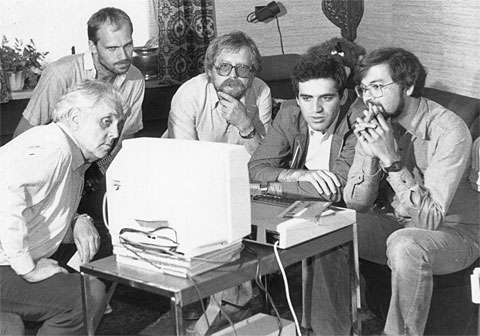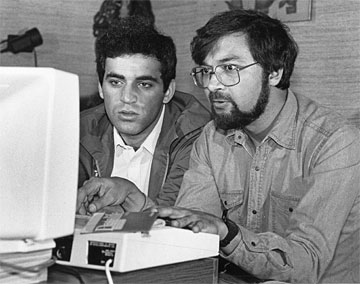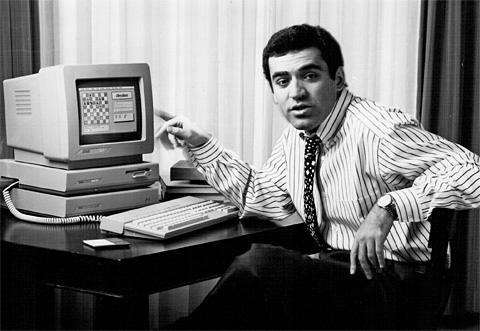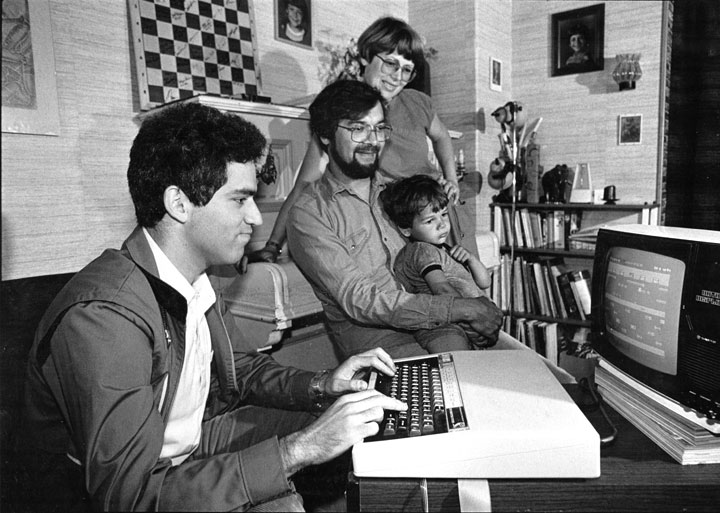Grandmaster Garry Kasparov, with Acorn’s BBC Micro, and with Atari’s ST, exploring endgames and helping educate the youngsters of Moscow:
Here Kasparov plays Acorn’s Frogger clone Hopper, and is trounced by a three-year old:
Kasparov’s BBC Micro connection:
I WAS INTRODUCED to computers in 1983, although I didn’t play chess with them at the time. The British computer company Acorn, the “British Apple,” sponsored my match against Viktor Korchnoi in London that year, and of course their products were on display. Businesses, hobbyists, and other early adopters across Europe were paying large sums for the first few generations of home computers and Acorn was doing very well. I won the match, putting me a step away from my first world championship contest with Anatoly Karpov the next year, and was also given an Acorn home computer to take back to Baku. I flew on Aeroflot sitting next to the Soviet ambassador, and my fragile new trophy had its own VIP seat and blanket.
Kasparov proceeded to try to kickstart microcomputer interest and access in the Soviet Union:
Losing to a little kid at Hopper was easier on my ego than any loss to Karpov, but it still gave me food for thought. How was my country going to compete with a generation of little computer geniuses being raised in the West? Here I was, one of the few people in a major Soviet city with a computer, and I had been handily outperformed by a German toddler.
And so, when I signed a sponsorship deal with the computer company Atari in 1986, I took as payment over fifty of their newest machines to bring back to form a youth computer club in Moscow, the first of its kind in the Soviet Union. I continued to supply the club with hardware and software acquired on my travels and it became a hub for many talented scientists and hobbyists.
Photo above from here and more below from here both links from chessbase and well worth reading.


(There’s a modern Frogger clone for the Beeb which is much closer to the arcade version - play here.)
And here, Kasparov with the Atari ST, and a couple of anecdotes about endgames…

The anecdotes, then, from this article:
in the early 1980s. Ken Thompson, the man behind Unix and the computer language C, had built a hardware chess machine named Belle, which duly won the World Computer Chess Championship. Ken had also resolved a dispute with IM David Levy on the feasibility of generating endgame databases — by actually generating a four-piece database, king and queen vs king and rook. (With the hardware available at the time (a mainframe in Bell Labs, New Jersey) it took half a day to process the endgame.) Soon after it was completed, we had a lot of fun, at a tournament in New Jersey, challenging top players to win with the queen. “But that is quite easy,” they would say, only to fail again and again against the optimum defence of the computer.
…at a tournament in Brussels, I got Karpov and Kasparov to sit together in front of my Atari ST and try to win queen vs rook. It was a hurried attempt in the press room after a round. They did not succeed, and laughed in amazement over the computer’s defence.
The other story is about a 14-year-old chess talent who stayed at my house and whom I asked if he could win with the queen vs the rook. “Of course I can,” he said, only to fail against the computer. The next morning at breakfast he announced he had found the strategy to win, and proved it with flawless play against the computer. The lad, whose name was Peter Leko, had actually worked it out in his head, while lying in bed in the dark.
(Image from this nearby post)
[Edit: this post recycled from diaspora.]

